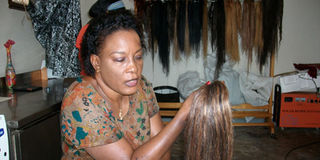Sarah Kiyingi reinvented her career after 27 years

Sarah Kiyingi displays hair made from organic raw materials.
What you need to know:
- Take two. Talking to Sarah Kiyingi, one can detect an excitement and vibrancy so rare in women her age. This new found youthful excitement is a result of a successful change of career after spending close to three decades in another, writes Benjamin Jumbe.
Sarah Kiyingi Kaweesa’s workshop is filled with beautifully crafted objects, amazing household furniture that she makes from recycled materials. The passion with which she talks about her trade, makes it hard to believe this is Kiyingi’s second career. The mother of four, spent the past 27 years working as a human resource manager, having trained in the field both in Uganda and the United Kingdom.
While in the UK, Kiyingi worked as personnel officer and later progressed into human resource. In 2003, she worked as general manager-human resource of Posta Uganda, she later worked as general manager of Dehezi International for one year before starting her own consultancy. She established a skills resource centre based in Bugolobi in 2005. And in 2007, she joined Lap Green Network owned by Libya Africa investment portfolio working as the group human resource manager.
“I was part of the team which was supposed to acquire different telecoms in Africa because we wanted to grow our portfolio. We managed to do that and within two years we had about 9 companies in telecoms operations including UTL,” Kiyingi relates. In 2012, she was made the group’s government liaison and CSR officer, a contract which ended in 2015.
In spite of such a flourishing career, Kiyingi said she still felt unfulfilled, which prompted her to leave an industry she knew very well to embark on a new journey of discovery. Her desire for innovation and art led her to start her own company, Bio Jigsaw Ltd. Bio Jigsaw Ltd is well known for manufacturing organic hair from banana fibre. In addition they recycle tyres, wine bottles and newspaper, among others, into household furniture and ornaments.
Light bulb moment
Kiyingi says she was bitten by the recycled art bug while in Dubai, UAE.
“While in a restaurant in Dubai, I noticed how car tyres had been turned into beautiful flowerpots. I asked myself what else could be done with them, so we started playing around and realised we could make proper sofa sets for sitting rooms and coffee tables. That is how we started making these kind of chairs,” Kiyingi relates.
She also experimented with newspapers transforming her dinning set, chairs and coffee set into a unique piece of art. Kiyingi believes there is a lot that can come from what many people would consider waste.
“There are plenty of opportunities out there which can be exploited by the country’s youth to better themselves. Unless we become job creators there will never be enough jobs. I meet graduates who think they must do administration because that is what they studied at university. What happens when there are no administrative jobs? The use of education is to give us the skills and knowledge to be self-reliant,” Kiyingi observes.
As a human resource practitioner, she notes that the best way to get people to be more effective and develop the company is to treat them well. She points out that the gap between employers and employees is that the former still think that money comes first before the people, which she believes should not be the case.
“You can write the most brilliant strategic reports and you can have all the money in the world but if your workforce is not motivated, you will not achieve much,” she cautions.
Her contribution to the sector
Kiyingi’s greatest contribution to the companies she worked with was to transform businesses through restructuring.
“People think restructuring is always about downsizing. But for me I used it to change people’s attitudes towards their work. I wanted people to work with me and not for me or the organisation, so, I made sure they understood why they were there and what their contribution should be and the goals of the organisation,” she relates.
First job
Kiyingi’s first formal job was in the UK where she worked with a factory called Shubette of London earning £77 (Shs 387,338)per week.
“That was a lot of money. I remember after my upkeep and sending some to Uganda to support my family I always had about £20(Shs100,645) which I saved,” she recounts.
Advice
She advises that those still in formal employment to wait until they save enough money before starting their own businesses because businesses require a lot of capital.
“And while you are working, you should have a creative mind. Do not just get out of employment because you have seen someone bringing containers of bags or sandals from China then you run into the same business, you must feel the passion for it,” she advises.
She implores the youth to be creative and strive to be manufacturers instead of importers. She advises that they can find something small, which is in existence and modify it.
“Young people should aim to become manufacturers rather than importers, we need people to come up with ideas, ideas which can help push Uganda forward, ideas which can help your families,” she advises.
Kiyingi was born to William Kamya Kiyingi and the late Faith Kansaze. She went to Mengo Primary School, Mengo Secondary School and Greenwich University in the UK where she pursued a degree in Business and Finance majoring in human resource.




